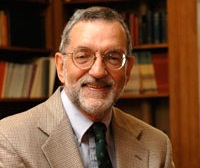
Kenneth S. Yalowitz is former US Ambassador to Georgia.
Kenneth Yalowitz: I don’t think that there is any question that this was a step forward. The fact that the elections were free and fair last October and the opposition coalition Georgian Dream won it and President Saakashvili agreed with the results of the election and basically stepped aside in terms of government. Of course, he is still the president. That’s a remarkable achievement and I think it was very well received not only in the US, but in Western Europe and everywhere where there are really true friends of Georgia.
It also brought in a new period. President Saakashvili had been in an office for more than 8 years, I believe, and people were accustomed to him. The new prime minister was not well-known. We had not really had a lot of contact with him. People were very impressed with the openness and fairness of the elections, but we did not know Mr Ivanishvili. We knew many people in the Georgian Dream coalition, but it was a time of uncertainty. After the elections there was concern when some arrests and indictments were made of members of the former government. There was concern expressed including by myself and others that this not turn into what we call political justice, that the new government would not simply begin jailing members of the old government without cause. Mr Ivanishvili made it quite clear that the people being indicted were not being indicted for political reasons, they were indicted for alleged crimes committed while they were in office. But still it was an uncertain period and knowing the history of Georgian politics as many of us do, we were concerned that there might be a political elements in some of these judicial trials. The cohabitation has not obviously been easy, it’s been very difficult.
This morning I was reading about the differences between the president and the prime minister on board a US vessel in Batumi. We have these things in our government as well. These were pretty serious charges that were leveled back and forth, but the key point that I wanted to make is that the cohabitation has not resulted in violence, it has not resulted in a breakdown of the government.
Defense Minister Alasania was in the US and I heard him speak and he was talking about how difficult the cohabitation is. It has actually worked pretty well in terms of military reforms; working to update and modernize the military, and that was reassuring because we’ve all seen that the cohabitation can be very difficult, sometimes it works very well but this is new for you and you’ve made it work reasonably well.
What is a concern now, you’ve mentioned the presidential elections coming up and after that, the stated intention of the prime minister to leave politics. This creates two new uncertainties. I know it’s having an impact already on foreign investment in Georgia. There are people concerned about what is the political situation going to be in the months ahead. So I think the first thing of importance is your presidential election. I don’t have great concerns about it being free and fair and open. But the more important thing is that there have been good quality debate during the presidential elections about Georgian foreign policy, about the relationship with Russia and about economic reforms. It is an opportunity for the public to be engaged and for the president to have a strong vote of confidence in terms of moving towards the West, towards NATO. I think these are all good things. And secondly, the possibility that Mr Ivanishvili would leave the office. So those are two of the uncertainties, but given what Georgia has done I see no reason why you cannot successfully deal with both of these issues.
DFW: There is uncertainty about whether Ivanishvili will visit the US. you mentioned in your opinion published on DFWatch last year just after the elections that Ivanishvilis statement that he would visit US first was a good signal, but almost a year passed and no visit has happened yet. What do you think are the reasons?K.Y: I’m no longer in government, so I can speak my mind. I would very much like to see him come to the US. We’ve had series of very successful visits. In the last few months, your justice minister has been here, your foreign minister has been here twice, the economics minister has been here, the prosecutor general was here with the speaker of parliament and now of course the defense minister. I think all these visits have been very useful. Many of these are people who are well known in the US before – Mr Alasania and Mr Usupashvili. I think all these are setting the ground-work and I hope that there will be a visit, but one of the problems I would imagine if Mr Ivanishvili is talking about leaving government rather soon it might be more difficult in the US to arrange a visit if he is going to be leaving the office in six or eight months, so that could be a problem.
But I do hope, I know that there’ve been opportunities before when he was a candidate in the opposition when Secretary Clinton was in Georgia, he declined the opportunity to meet with her, because it was part of a group and he wanted to meet her alone. I myself think that that was a mistakee. I think it was important for him to meet her and I wish he had done so, and I wish also that there had been another way of him coming to the US, but he has his criteria and we have ours and so far we’ve not been able to bring them together. But as I say I think the relationship between our countries and our governments is quite good, we have excellent communications all across the board thanks to the visits of these ministers.
DFW: Taking into count the changes in the constitution which drastically reduces the power of the president and at the expense of the power of the prime minister, is this elections interesting in the US?K.Y: Definitely. In light of the successful and free and fair elections that you had almost one year ago, the presidential elections should be equally free and fair. I’m concerned that they be that way. All I’m saying is I don’t want to see Georgia go backwards. You have already succeeded, and I’m taking it as an assumption that these elections will be that way. I have concerns, but I do think that it should happen this way. Yes, the powers will flow from the president to the prime minister, but I still think it is important symbolically that there be free and fair election. If the UNM candidate should win then there is a question of the cohabitation, whether how that will succeed. If the Georgian Dream candidate wins than you will have the united government and that will present the opportunities to show a united policy and really a a further step forward. So either way the election goes, it is going to be watched. One – if the cohabitation continues how they will work or two, if there is a unified president and prime minister in the same party, whether that’s going to be bold steps forward for Georgia in terms of economic reform and moving forward in security issues in a way that [Defense] Minister Alasania lined out. He lined out in his speech and also in meetings that I was in, a very progressive and a very important series of steps with Georgia in terms of its military, in terms of reforming, in terms of trading, in terms of organization, and as I say, I think people are going to be watching whoever way the presidential election goes, to see how those programs work. So it is going to be a challenge either way: a), if cohabitation is going to continue, how the government will function; b) if it is a unified government, is it going to move very quickly and directly and comprehensively in terms of economic and military reform.
DFW: Saakashvili’s second and last term expires this October and there are no clear indication about his political future. How do you envisage his political future after October?K.Y: That’s a very good question, which of course only he can answer. My hope knowing how talented and active he is, is that he would take a time once he leaves an office and perhaps write his memoirs, which are going to be very important in terms of the recent history of Georgia. But I would love to see him start working with young people; I would love to see him at a university, where he could perhaps do his memoirs, and teach and mentor young people. He’s a very charismatic, very intelligent man whether you agree with him or not, he has a lot of to say and lot of important insights and information, and I really think it would be good, both for Georgia and for him, to take a breather, as we say in the US, to take some time and get his thoughts together. To think about what he wants to do over the long term. And the best way to do that, cause I have done it myself, is to go to a university and write and mentor young people. You can still write op-eds, you can still make speeches, but it’s an opportunity for the leadership in Georgia to get accustomed to new faces and new people. So I think a breathing space is good for the president and it is also good for Georgia to have a new president, prime minister, whether or not Mr Ivanishvili continues, as I say it is his decision to make. But all of us want to see a stable situation in Georgia with a new generation, new leaders, new young people coming up. You are an extremely talented country, you are blessed with some exceptional young people, new people and I would like to see them have the opportunity, new people on the political stage.
DFW: Some People here are afraid of if the Syrian conflict goes through Russia. Perhaps it seems illogical, but they think that if Russian interests are hit in Syria it might somehow vent its anger towards its weaker neighbor.K.Y: I don’t think that is very likely. It’s five years since the war with Russia when they obviously won a tactical military victory, but diplomatically, I think, were defeated. I think their recognition of South Ossetia and Abkhazia has put them into a diplomatic “manhole”, a very difficult corner from which they can’t get out. Only a few small countries have recognized the two, and none of the former Soviet countries have recognized Abkhazia and South Ossetia. To me, the Russians won a military victory, but it incurred a diplomatic defeat.
I don’t think at this point in view of what they have done they would be looking to do something militarily. I may be wrong. I don’t think that is a great risk, that they are going to attack Georgia again. Maybe I think they will look at other ways to respond to a limited military strike.
Particularly if it’s been demonstrated that Syrians used the chemical weapons against their own people, it would be very hard for Russia to stand up and support Assad. It’s possible that they might put some more troops in Abkhazia and South Ossetia, but they’ve already done that. They’ve already put a lot there and I think they recognize that whatever the US does in Syria it will be limited. We’re not going to put a large force on the ground, at least I don’t believe so. So I don’t think that the escalation is one that they would feel that they would have to respond to, and besides, their military is not in a terrific shape as far as I know. They are still in the process of reform; they are fighting a lot of corruption. I’m just not sure that they would be anxious to do anything as well. That’s not to say that we should not keep our guard up, that we should not keep watching very, very carefully, but I do think what the US will do will not be something that will set off a succession of military steps and countersteps. I think that’s why President Obama is going so carefully. But again with Russia we never know. I will be the first to admit that. Mr Putin is moving in some very bad directions domestically in Russia and we have to keep a very very close eye on that.
DFW: This situation when relationships between the Russian Federations and the West is escalating and it had began long before this stage of Syrian escalation. In this regard how do you think Georgia’s NATO membership odds are increasing or decreasing?K.Y: Alliance has said that Georgia will become a member. The question is more of timing. When [Defense] Minister [Irakli Alasania] was here he outlined the variety of steps and he knew the importance of the elections coming up and of economic reforms in Georgia and the importance of Georgia continuing to take the military reform steps. He gave out a very interesting publication in English of the military reform project and it’s very comprehensive and very thorough. What he said was I think that he recognize that this is going to take time, but what he was looking forward at the NATO summit next year, was some sort of specific, some tangible indication, response from NATO about the all the things that Georgia is doing.
The tremendous support that you are giving to the US and allies in Afghanistan, the fact that you’ve lost troops there, these were recognized and very very highly evaluated. But his point was that Georgia would very much likes to see some type response from alliance indicating that there is either type of timetable or that this is specifically what needs to be done. But I think that the key point is that he recognizes and your leadership recognizes that you’re still a ways off from meeting all the criteria of membership. The economy still needs to be reformed, there is problem, of course not that youR making, but Russian military bases in Abkhazia and South Ossetia, which are Georgian territories, and what will this mean in terms of NATO membership. You’ve got a whole series of military reforms that’s going to be done. He was also talking about the need for training specialists to deal with equipment, so that Georgia’s forces will be more interoperable with NATO forces. There is still a distance to go. My best advice is for you to continue to do what you are doing. It’s noticed, it’s appreciated, and I think if you can get through the elections as I said on a free and fair basis, if the question of whether Mr Ivanishvili stays or whether he goes, if he is replaced by someone who is respected. I think these are all building blocks leading towards a more positive relationship with NATO. It is not going to happen overnight. I think everyone acknowledges that. But I think you’re moving in the right direction and I think it is within your power to take more steps that will improve the situation.

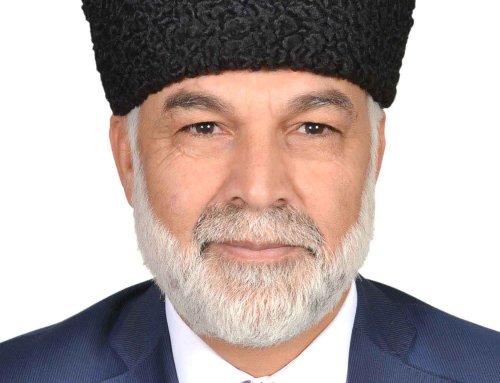
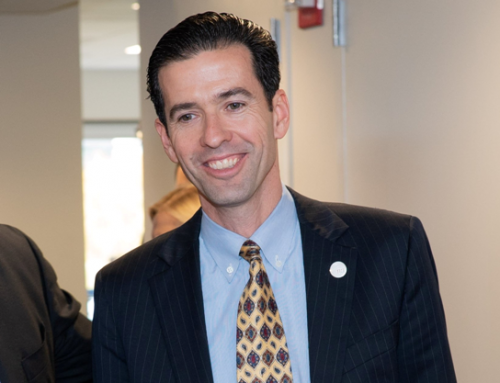
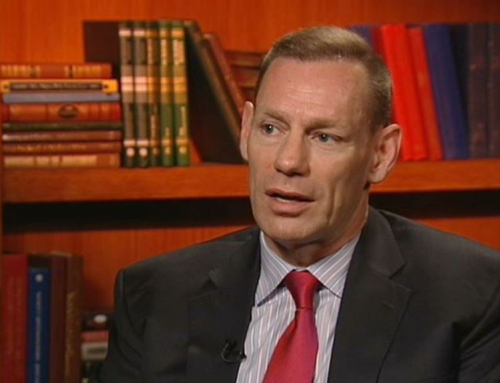
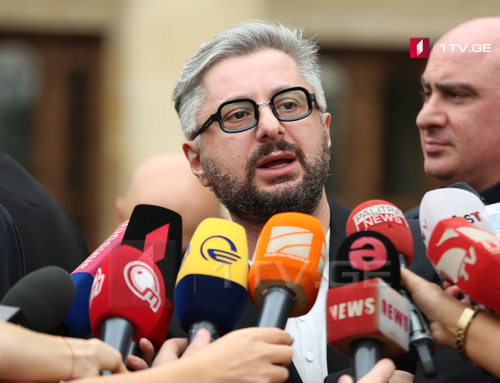
Leave A Comment
You must be logged in to post a comment.